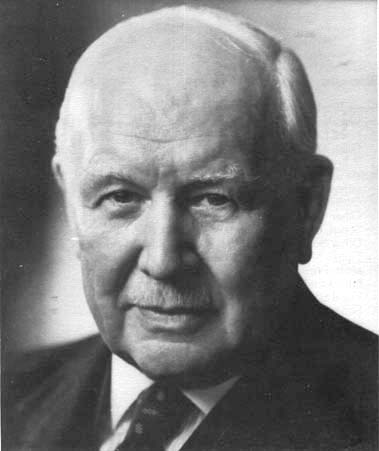Franz Lehár |
(1870 - 1948)
After graduating he joined the army and played for a time in his father's orchestra, where he shared a desk with his friend and later composer colleague Leo Fall. From there, it was a logical step to the podium and at the age of twenty he became the youngest bandmaster in the Austro-Hungarian army. His posting, at the empire's only naval base, in Pola on the Adriatic, gave him the rare experience of having a 110-piece orchestra at his disposal, with which he was able to perfect his orchestration technique. While there he met his first theatre librettist, the naval officer Felix Falzari. Their collaboration resulted in Lehár's first opera 'Kukuschka'', which was performed in Leipzig and Budapest, though without attracting much interest and the composer, who had resigned rather prematurely from the army hoping that composition would sustain him, had (rather ruefully) to rejoin when the meagre flow of royalties from 'Kukuschka' dried up. A military posting to Vienna finally unlocked doors for Lehár. Composing the 'name waltz' for Princess Metternich's 'Gold and Silver' ball in January 1902 suddenly brought his talent to general notice and the happy publisher to whom Lehár had contracted the waltz found himself overwhelmed with requests for it from all over the world. Lehár finally left military service and took on the post of Kapellmeister at the Theater an der Wien, for which he wrote an operetta 'Wiener Frauen' for the Christmas 1902 season --- at the same time as he was writing another, 'Der Rastelbinder', to the libretto of Victor Léon, chief producer at the rival Carltheater! Once the news broke, Lehár had to resign from the Theater an der Wien and choose the risky independence of being a full-time composer. The gamble paid off in three years: on 30 December 1905 'Die lustige Witwe' was premièred at the Theater an der Wien and, after a few anxious weeks, became a veritable forest fire, whose success swept throughout continental Europe, Great Britain, the United States in fact, to every corner of the world. 'The Merry Widow' has, for ninety years now, broken box-office records and delighted audiences wherever it has been played. Countless recordings, several films and television features, a full-length ballet an ice-show - no medium yet devised has not featured this 'queen of operettas'. Lehár was now a very rich and successful man: by his later admission 'I stumbled blindly into writing operetta, without any idea of what I was doing, but this helped me to find my own style', and indeed he brought to operetta an intensity of feeling and depth of characterisation that it had not previously known. Other major successes, 'The Count of Luxembourg', 'Gipsy Love' and 'Eva', added still more to his fame and fortune before 1914. The First World War, and the resultant destruction of the Austro-Hungarian world in which Lehár had grown up and matured, seemed to inhibit his talent for some time and he passed through a relatively fallow period until the Vienna production of 'Frasquita' in 1922 brought him for the first time into contact with the young operatic tenor Richard Tauber. The effect on Lehár was electric and during the period between 1925 and 1934 he wrote six operettas, created especially for Tauber's voice, each with an endless flow of lyrical songs, duets and ensembles, and each including what became known as the 'Tauber-Lied' - 'Paganini' (1925), The Czarevitch' (1926), 'Frederica' (1928), 'The Land of Smiles'(1929), Schön ist die Welt' (1931) and 'Giuditta' (1934), the last of which was premièred at Vienna's Staatsoper with Tauber and Jarmila Novotna in the leading roles. In February 1935 Lehár decided to found his own publishing house in order to have the greatest possible control over the performance and availability of his works. He incorporated Glocken Verlag Vienna on 15 February 1935. He reacquired most of his oeuvre from other publishers to whom he had previously sold various rights and devoted much time to the publication of definitive editions. He died in Bad Ischl on 24 October 1948. For many decades now, the administration of this repertoire has been entrusted to the Glocken Verlag Companies in Vienna, London and Frankfurt/Main, administered by the Josef Weinberger group publishing houses in those cities.
|
 Franz Lehár was born in Komáron (now in Slovakia) on 30
April 1870, the eldest son of a bandmaster in the Austro-Hungarian army.
During his boyhood years the family moved from post to post, but the atmosphere
was always full of music. At the age of fifteen, he was admitted to the
Prague Conservatoire of Music, where he studied violin and composition
and is said to have been advised by no less a figure than Dvorak to 'Hang
up your fiddle, my boy, and write music!'
Franz Lehár was born in Komáron (now in Slovakia) on 30
April 1870, the eldest son of a bandmaster in the Austro-Hungarian army.
During his boyhood years the family moved from post to post, but the atmosphere
was always full of music. At the age of fifteen, he was admitted to the
Prague Conservatoire of Music, where he studied violin and composition
and is said to have been advised by no less a figure than Dvorak to 'Hang
up your fiddle, my boy, and write music!'